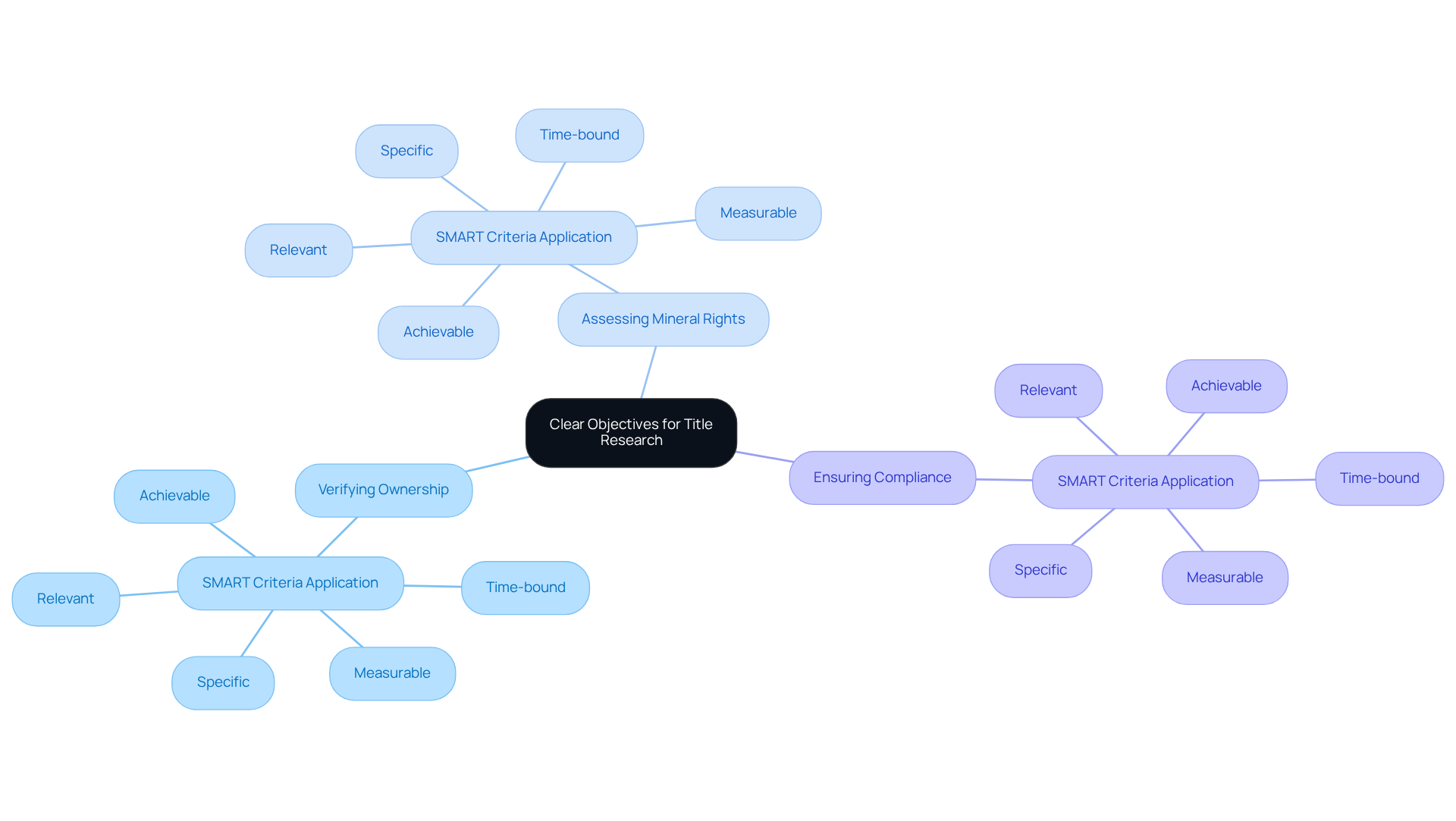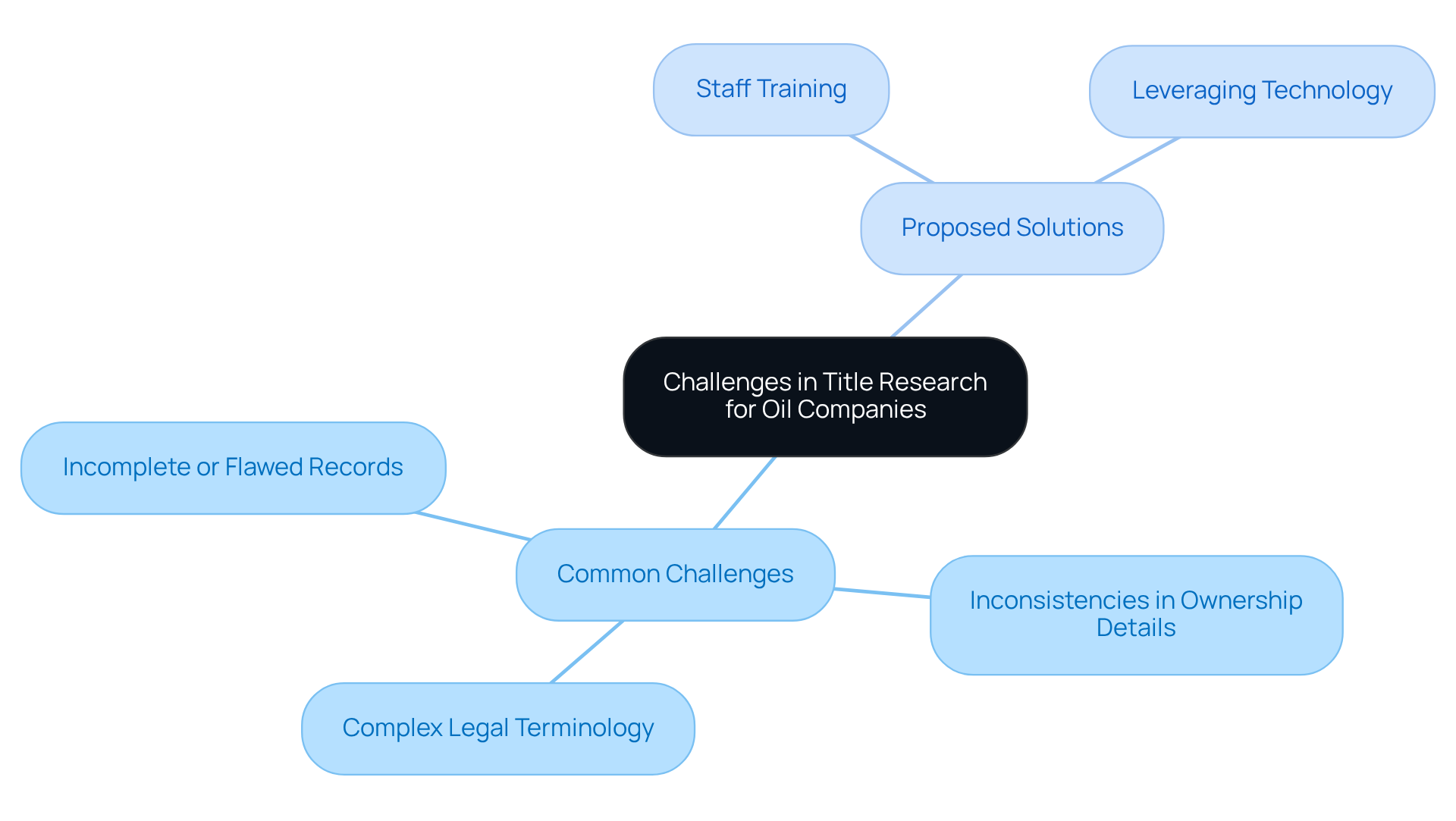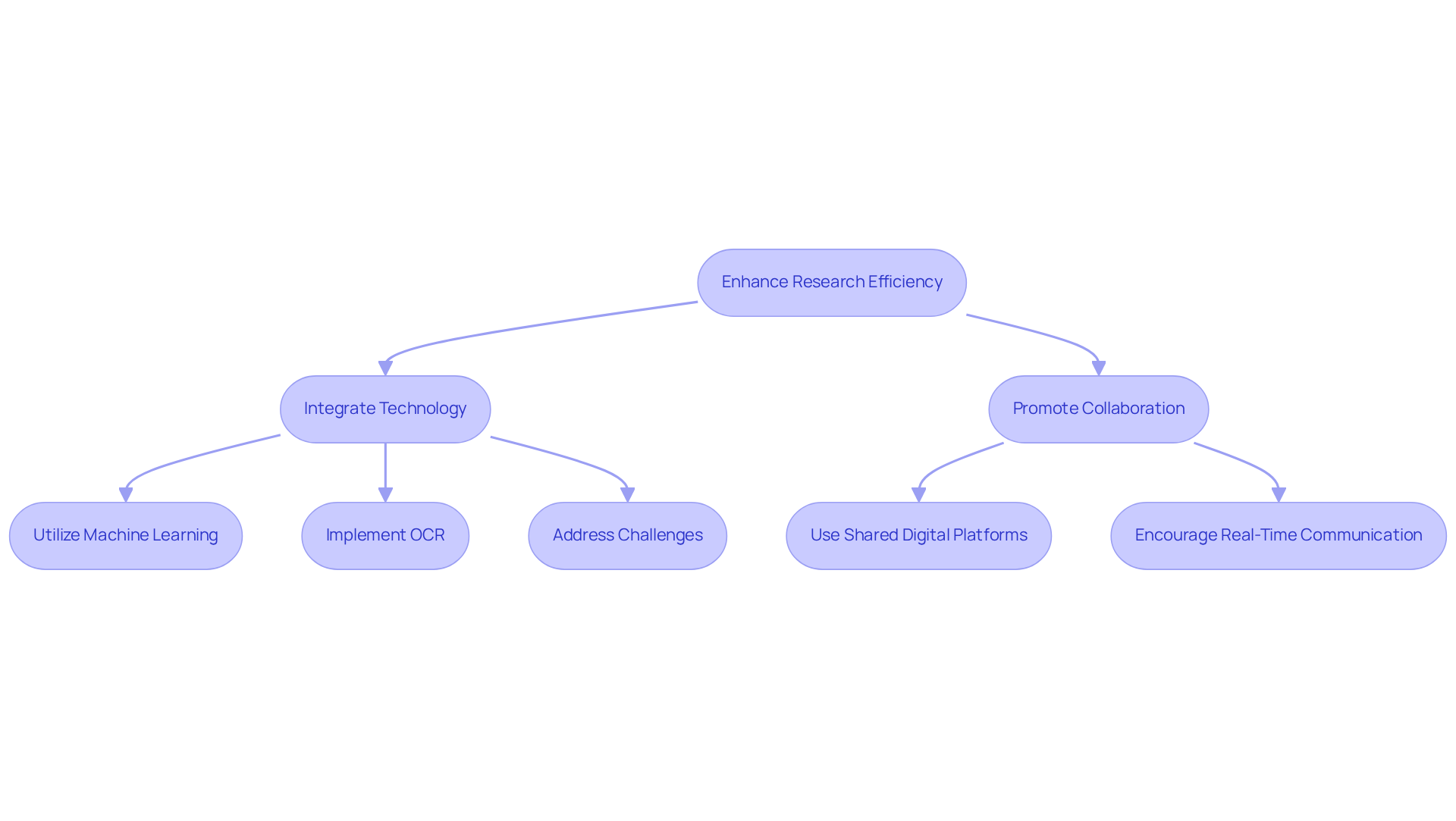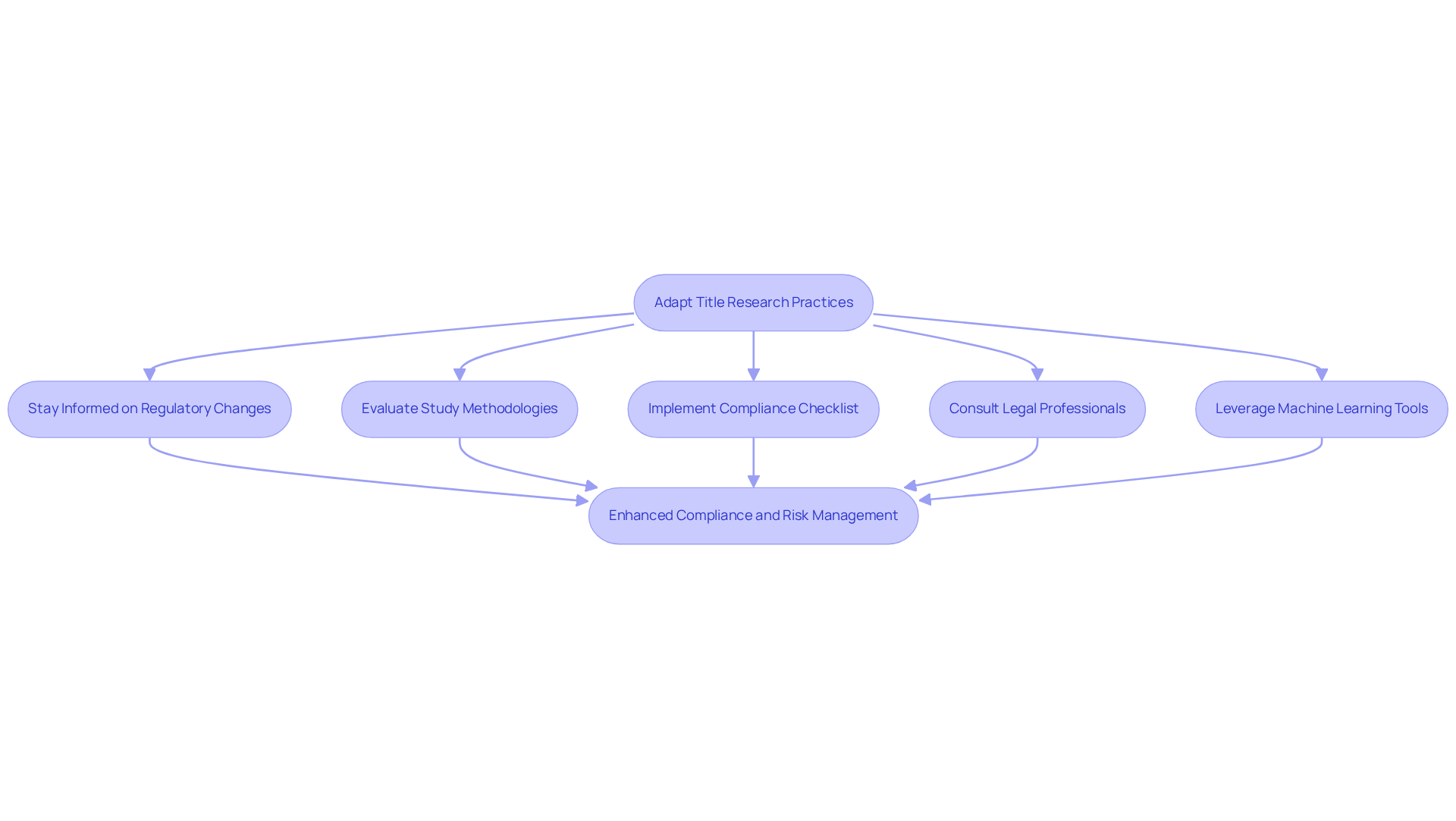Overview
The article delineates four pivotal strategies to enhance the title research process for oil companies. It emphasizes the necessity of:
- Establishing clear objectives
- Identifying prevalent challenges
- Implementing advanced technology
- Adapting to evolving regulatory changes
Each strategy underscores the critical importance of clarity, technological integration, and adherence to legal standards, all aimed at bolstering efficiency and mitigating risks inherent in the title investigation process.
Introduction
The title research process is a critical yet often overlooked aspect of the oil and gas industry, where clarity and accuracy can mean the difference between success and costly setbacks. By adopting strategic approaches, oil companies can enhance their research efficiency and ensure compliance with ever-evolving regulations. However, the path to improvement is fraught with challenges, including:
- Incomplete records
- Complexities of legal terminology
How can organizations effectively navigate these obstacles? Leveraging technology and collaboration can refine their title research practices.
Establish Clear Objectives for Title Research
To enhance the title investigation process, oil companies must prioritize the establishment of . This begins with identifying specific outcomes desired from the study, such as:
By applying the SMART criteria—Specific, Measurable, Achievable, Relevant, and Time-bound—companies can formulate actionable objectives that effectively steer their investigative efforts. For example, an organization might aim to finalize ownership verification for a specified parcel of land within three months, ensuring that all required documentation is thoroughly collected and examined. This level of clarity sharpens focus and fosters improved communication among team members and stakeholders engaged in the study process.
Research indicates that organizations with well-defined objectives experience enhanced team performance; clarity in goals leads to greater alignment and accountability. Furthermore, setting between 3-5 SMART goals helps maintain focus and capture opportunities effectively. As noted by industry experts, collaboration in goal setting increases employee engagement and ownership, making it essential for achieving desired outcomes.

Identify Common Challenges in Title Research for Oil Companies
Oil firms encounter significant obstacles in the title research process for oil companies, particularly due to:
- Incomplete or flawed records
- Inconsistencies in ownership details
- Complex legal terminology that can hinder comprehension
Absent transfers in the chain of ownership can lead to substantial delays and potential legal conflicts. Furthermore, the interpretation of legal documents often necessitates specialized knowledge, posing a barrier for teams that may lack legal expertise.
Industry leaders emphasize the critical importance of addressing these discrepancies within the title research process for oil companies, noting that proactive measures can significantly mitigate risks. By investing in staff training and leveraging technology to enhance data extraction and analysis, organizations can effectively tackle these common issues. This strategic approach not only reduces the likelihood of mistakes but also of the document examination process, ultimately facilitating improved decision-making in the oil and gas industry.

Implement Technology and Collaboration to Enhance Research Efficiency
To enhance research efficiency, oil companies must leverage and foster collaboration among team members. The integration of machine learning and optical character recognition (OCR) tools can automate the extraction of vital information from document titles, significantly minimizing the time spent on manual data entry. For instance, deep learning OCR systems adeptly manage large data volumes, rendering them scalable for organizations with substantial document processing demands. This capability enables ownership researchers to quickly pinpoint key details and discrepancies with human-like accuracy. Such technology not only streamlines workflows but also improves data accuracy, a critical factor in the high-stakes oil industry.
Furthermore, promoting collaboration through shared digital platforms facilitates effective communication among team members, allowing them to exchange insights and tackle challenges in real-time. As Ginni Rometty, former CEO of IBM, aptly stated, "AI will not replace humans, but those who use AI will replace those who don't." By merging technological innovations with a cooperative strategy, firms can significantly enhance their investigation processes, leading to faster and more accurate title verification. This synergy not only elevates productivity but also positions organizations to respond more adeptly to the dynamic demands of the oil sector. It is also crucial to recognize the challenges posed by machine learning OCR, such as variability in document layouts, which can affect performance. Addressing these challenges is essential for successful implementation.

Adapt and Evolve Title Research Practices for Regulatory Compliance
Oil enterprises must consistently enhance their title research process for oil companies to comply with changing regulatory standards. Staying informed about and property ownership is crucial, especially given the frequency of regulatory changes published daily in the Federal Register. Frequent evaluations of study methodologies ensure adherence to state and federal guidelines.
For instance, a recent report revealed that 20 oil and gas companies in Colorado failed to report the chemicals used in drilling and fracking operations, highlighting the potential financial repercussions of non-compliance, which could amount to over $37 million in fines. Implementing a compliance checklist can help teams verify that all necessary documentation is complete and meets legal standards. Furthermore, interacting with legal professionals can offer important perspectives on the intricacies of the regulatory environment, ensuring that documentation practices remain strong and compliant.
Additionally, leveraging advanced machine learning tools from Parse AI, such as the example manager for quick annotation and the title research process for oil companies, can expedite document processing and enhance compliance checks. As noted by Thad McBride, the cost of non-compliance—including fines and reputational damage—far outweighs the investment in effective compliance programs. By prioritizing regulatory compliance and utilizing innovative solutions like those from Parse AI, oil companies can mitigate risks and enhance their reputation within the industry.

Conclusion
Establishing a robust title research process is essential for oil companies aiming to navigate the complexities of ownership verification, regulatory compliance, and data accuracy. By setting clear objectives grounded in the SMART framework, organizations can enhance focus and accountability, ensuring that their research efforts yield meaningful results. This clarity not only improves team performance but also fosters a culture of collaboration, ultimately leading to better outcomes in the high-stakes oil and gas industry.
Throughout the article, key strategies for improving title research have been discussed. These include:
- Identifying common challenges such as incomplete records and legal complexities
- Leveraging technology for efficiency
- Adapting practices to meet evolving regulatory standards
By investing in advanced tools and fostering teamwork, oil companies can streamline their processes, reduce errors, and ensure compliance with legal requirements. The insights provided underscore the importance of a proactive approach to title research, which can significantly mitigate risks and enhance operational effectiveness.
In conclusion, the journey towards improved title research is one that requires a commitment to continuous improvement and adaptation. By embracing innovative technologies and maintaining open lines of communication among team members, oil companies can not only enhance their research processes but also position themselves as leaders in the industry. The stakes are high, and the potential for significant financial and reputational repercussions makes it imperative for organizations to prioritize these strategies. The time to act is now—implement these best practices and stay ahead in the competitive landscape of oil and gas.
Frequently Asked Questions
What is the importance of establishing clear objectives for title research in oil companies?
Establishing clear objectives is crucial as it enhances the title investigation process by identifying specific outcomes desired from the study, such as verifying ownership, assessing mineral rights, and ensuring compliance with regulatory requirements.
What criteria should be used to formulate actionable objectives?
The SMART criteria should be used, which stands for Specific, Measurable, Achievable, Relevant, and Time-bound. This helps companies create clear and actionable objectives that guide their investigative efforts.
Can you provide an example of a SMART objective for title research?
An example of a SMART objective is aiming to finalize ownership verification for a specified parcel of land within three months, ensuring that all required documentation is thoroughly collected and examined.
How do well-defined objectives impact team performance?
Research indicates that organizations with well-defined objectives experience enhanced team performance, as clarity in goals leads to greater alignment and accountability among team members.
How many SMART goals should organizations set for effective focus?
Organizations should set between 3-5 SMART goals to maintain focus and effectively capture opportunities.
What role does collaboration in goal setting play in achieving desired outcomes?
Collaboration in goal setting increases employee engagement and ownership, making it essential for achieving desired outcomes in the title research process.




